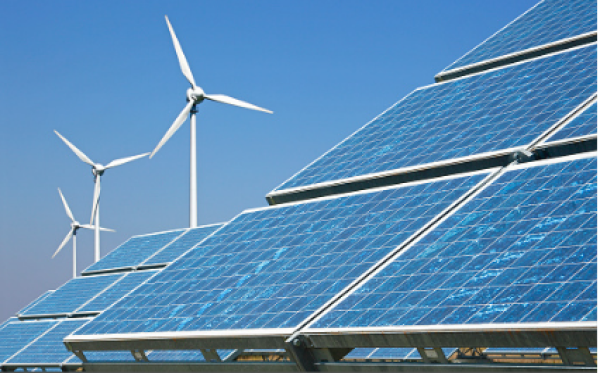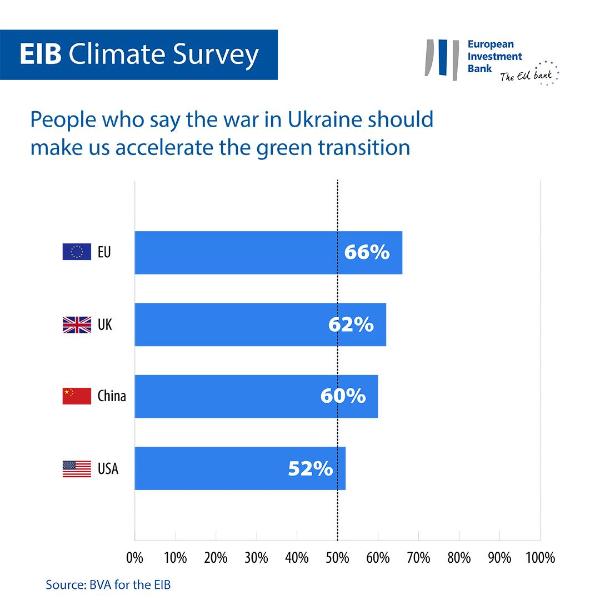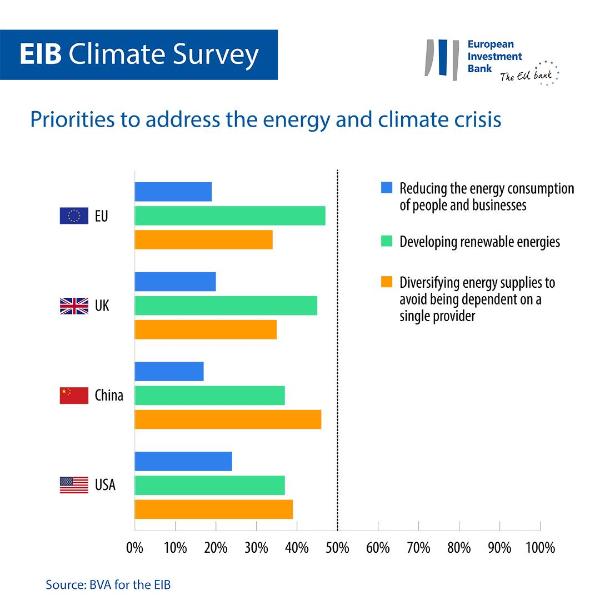
- 66% of people surveyed in the European Union believe that the Russian invasion of Ukraine and its consequences should accelerate the green transition (vs. 62% in the United Kingdom, 60% in China and 52% in the United States).
- 84% of EU respondents say that if we do not drastically reduce our consumption of energy and goods in the coming years, we will be heading for a global catastrophe (vs. 88% of Chinese respondents, 83% of British respondents and 72% of American respondents).
- 63% of people surveyed in the European Union want energy prices to be tied to consumption, with the biggest consumers charged more (vs. 87% in China, 63% in the United Kingdom and 57% in the United States).
These are some of the results from the latest yearly Climate Survey conducted in August 2022 and published today by the European Investment Bank (EIB). The EIB is the lending arm of the European Union and the world’s largest multilateral lender for climate action projects.
After a challenging year in which Russia’s invasion of Ukraine sparked an ongoing energy crisis and exacerbated inflation all over Europe and beyond, and a summer of extreme weather events marked by record heatwaves and droughts, people around the world have become even more acutely aware of the impact of climate change and the urgency to act.
Climate change awareness and urgency
While COVID-19 was considered the number one challenge facing EU, British and American citizens last year, economic issues now dominate their concerns. The increased cost of living and widespread economic and financial issues top the list in the European Union, the United Kingdom and the United States. In China, the coronavirus pandemic remains the number one concern of the population.
A large majority of people surveyed in the European Union and China say they feel the effects of climate change on their daily lives (80% and 91%, respectively). Meanwhile, this perception is less pronounced among Americans (67%) and British people (65%).
84% of EU respondents say that if we do not drastically reduce our consumption of energy and goods in the coming years, we will be heading for a global catastrophe (vs. 88% of Chinese respondents, 83% of British respondents and 72% of American respondents). Meanwhile, 87% of people surveyed in the European Union and 85% in the United Kingdom feel that their government has been too slow to act in averting climate change, an opinion that is slightly less prevalent in China (76%) and the United States (74%). Only a minority of British, EU and American respondents think that their governments will succeed in substantially reducing their carbon emissions by 2030 (30%, 36% and 45%, respectively). Chinese respondents seem much more confident, with 91% saying their government will succeed in doing so.
War in Ukraine and green transition
Most EU (66%), British (62%) and Chinese (60%) respondents believe that the war in Ukraine and its consequences on the price of oil and gas should accelerate the green transition. Americans are split: a narrow majority (52%) agrees, while 48% view the war as a reason to actually slow down the green transition.


When asked to rank their priorities on energy, nearly half of people surveyed in the European Union (47%) and in the United Kingdom (45%) want their government to prioritise the development of renewable energies (vs. 37% in both the United States and China). According to Chinese respondents (46%), the priority should be to diversify energy suppliers (vs. 34% in the European Union, 35% in the United Kingdom and 39% in the United States). Among American respondents, support for the two options of diversifying energy suppliers (39%) and developing renewable energies (37%) is more balanced.
Energy savings comes in third position, with 24% of Americans surveyed saying that individuals and companies must do more to reduce their own consumption (vs. 20% in the United Kingdom, 19% in the European Union and 17% in China).
Tackling climate change and addressing high energy prices
To reduce energy consumption, 64% of EU respondents want polluting activities, such as air travel and SUVs, to be taxed more heavily to account for their environmental cost (vs. 84% in China, 66% in the United States and 52% in the United Kingdom). A majority of EU citizens surveyed (63%) also want energy prices to be tied to household consumption levels (vs. 87% in China, 62% in the United Kingdom and 56% in the United States).
Finally, on addressing high energy prices, 40 % of EU respondents think that in the short term, the government should first reduce energy-related taxes (vs. 29% in the United Kingdom, 24% in China and 23% in the United States). Other measures, such as capping or regulating the price of gas, oil and coal, are more favoured by British, Chinese and American respondents (46%, 38% and 29%, respectively) than EU respondents (28%).
EIB Vice-President Ambroise Fayolle said: “The results of the EIB 2022 Climate Survey show that, for people around the world, the crisis is also an opportunity to accelerate the transition of our economies towards a low-carbon and climate-resilient future. At the EIB, we have been supporting innovative clean energy investments for many years. As part of our transformation into the EU climate bank, we stand ready to continue using our full range of financial and advisory instruments to support the acceleration of our partners’ green transition efforts, including through the implementation of the REPowerEU plan, while making sure we leave no people or place behind.”
Background information
About the EIB Climate Survey
The European Investment Bank has launched the fifth edition of the EIB Climate Survey, a thorough assessment of how people feel about climate change. Conducted in partnership with market research firm BVA, the fifth edition of the EIB Climate Survey aims to inform the broader debate on attitudes and expectations in terms of climate action. More than 28 000 respondents participated in the survey in August 2022, with a representative panel of people aged 15 and above for each of the 30 countries polled.
About the European Investment Bank (EIB)
The EIB Group has adopted a Climate Bank Roadmap to deliver on its ambitious agenda to support €1 trillion of climate action and environmental sustainability investments in the decade to 2030 and to deliver more than 50% of EIB finance for climate action and environmental sustainability by 2025. As part of the roadmap, all new EIB Group operations have been aligned with the goals and principles of the Paris Agreement since the start of 2021.
EIB Global is the EIB Group’s new specialised arm dedicated to increasing the impact of international partnerships and development finance. EIB Global is designed to foster strong, focused partnerships within Team Europe, alongside fellow development finance institutions and civil society. EIB Global brings the Group closer to local people, companies and institutions through our offices across the world.
About BVA
BVA is an opinion research and consulting firm recognised as one of the most innovative market research firms in its sector. Specialised in behavioural marketing, BVA combines data science and social science to make data inspiring and bring it to life. BVA is also a member of the Worldwide Independent Network of Market Research (WIN), a global network of some of the world’s leading market research and survey players, with over 40 members.